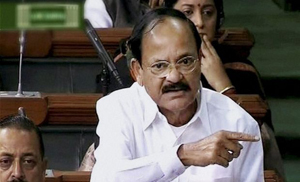New Delhi, Mar 2: BJP today alleged that the decision to change the affidavit in Ishrat Jahan encounter case was taken at the "political level" involving the then Home Minister P Chidambaram, then Prime Minister Manmohan Singh and Congress President Sonia Gandhi, and asked Congress to come clean on it.
 Parliamentary Affairs Minister M Venkaiah Naidu charged that CBI was misused by the then UPA government to harass its political opponent and "defame" the then Gujarat Chief Minister Narendra Modi, who is now Prime Minister.
Parliamentary Affairs Minister M Venkaiah Naidu charged that CBI was misused by the then UPA government to harass its political opponent and "defame" the then Gujarat Chief Minister Narendra Modi, who is now Prime Minister.
He said the issue needs to be debated and discussed in Parliament and appropriate action needs to be taken.
"First it was Lashkar-e-Taiba's website, secondly it was David Headley's statement and thirdly it was central government affidavit in the Gujarat High Court and Gujarat Police also said it. IB has said it. In spite of all these, they changed the affidavit.
"Now another startling revelation by former Home Secretary G K Pillai (who is) saying that the decision to change the affidavit was taken at the political level. Political level means the then Home Minister P Chidambaram, Prime Minister and Congress President. These are the three people who were at the helm of affairs," Naidu told reporters here.
He also cited former Under Secretary in Home Ministry R V S Mani's statement that he was forced and tortured.
"The torturing of government officer by other agency at the behest of political leadership, you can understand how much misuse was done by the previous government with regard to CBI. How political opponents were harassed. The entire plan was to stop Narendra Modi, defame Narendra Modi, implicate Narendra Modi," he said.
"Congress party should come clean instead of simply denying it. What do you say? What is the justification for change in affidavit? Do you have an answer? explain," he said.
Naidu said his government was ready to discuss all matters in Parliament. Leader of Congress party in Lok Sabha Mallikarjun Kharge said it would be better if Chidambaram speaks on the matter. "I do not have details on it. It would be better if Chidambaram speaks on it. I do not want to comment on it," Kharge said.
Congress spokesman Abhishek Singhvi had accused BJP of spreading a lie about American-Pakistani terrorist David Headley and said it was "very unfortunate" that the ruling party was resorting to false propaganda.
The trigger for the recent political battle is the interview of Mani, who had filed two affidavits. In the interview, Mani alleged he was tortured to implicate senior IB officials in the case to project the encounter killing of Ishrat and other three LeT terrorists in Ahmedabad in 2004 as fake.
Mani suggested that Chidambaram was behind the decision to file the second affidavit. He alleged that the then chief of Special Investigation Team (SIT) going into the case, a CBI official, was after him and an attempt was made to question the quality of professional inputs by the intelligence agencies on Ishrat and other terrorists.
Speaking on the matter, CPI(M) Politburo member Brinda Karat said there has been an encounter killing. "Whether or not Ishrat Jahan was an LeT operative is a different issue and that issue is before the Supreme Court. Let the Supreme Court come to its own conclusion. But the basic issue here is that it was an encounter killing," she said.
Road, Transport and Highways Minister Nitin Gadkari said at that time, the Congress party and former Home Minister Chidambaram had done some activities which were "anti-national". "It is sort of helping terrorists and the issue should be investigated and the culprits should be punished," Gadkari said.





Comments
Guys see this one more issue....Can you all concentrate on any one of the issue going in our nation ? No, coz any 1 of the issue if you are addressing or protesting against it the other issue will come up and the entire nation will forget the earlier. Let me try to get something in list
Vyapam Scam - Punbaj Attack- Pathankot attack- Rohit Vemula- Ishrath Jahan encounter Devid headly's statement- JNU- Sonu Sori- Budget - Now affidavit issue with Ishrath jahan's case. ( Lot of attacks on daliths, muslims, secular people and thinkers in b/w all of these issues )
On which issue nation will speak ? On which are you gonna question the ruling ? Which things media will highlight / Debate...1, 2 ,3 ???? Common guys wake up , what is our India gonna become ?
Add new comment